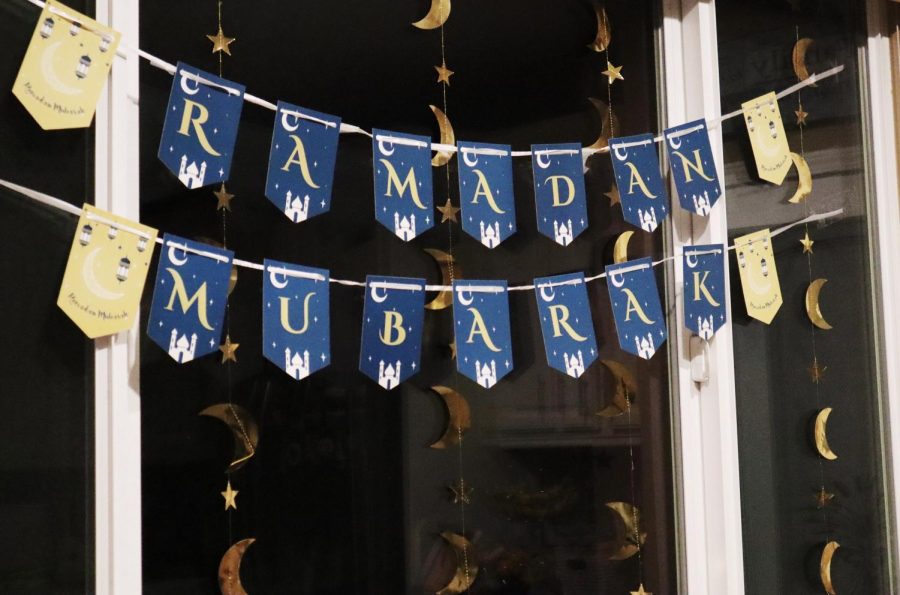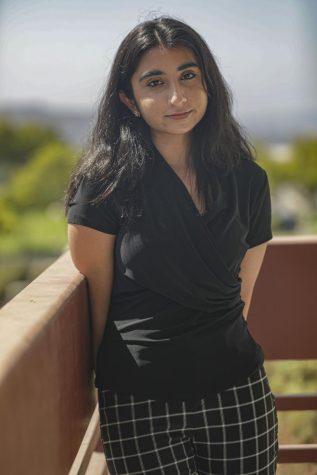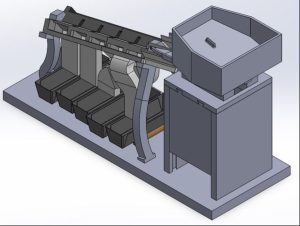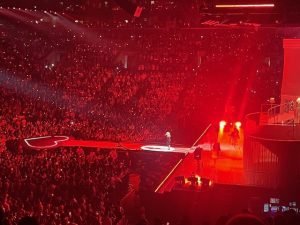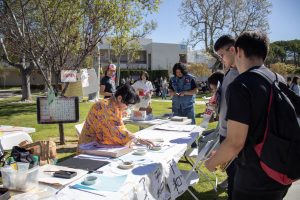Ramadan: It’s not just fasting
A banner hanging in front of celestial decorations reads “Ramadan Mubarak” on March 31, 2022. The phrase welcomes the month-long tradition of fasting and reflection. Photo Credit: Shahbano Raza
April 10, 2022
The time has come for Muslims around the globe to observe a month-long period of fasting and introspection. Referred to as Ramadan, this fundamental pillar of Islamic tradition, although widely observed, is still filled with misconceptions under the lens of contemporary perception.
During Ramadan, which began on April 2, Muslims fast from sunrise to sundown and take the month to improve themselves and their relationship with God.
Moorpark College’s Muslims Student Association shed some light on the sacred month and its many aspects. MSA Secretary Ghausia Parveen discussed the true intents and purposes of Ramadan, which tend to be overshadowed by mass misconceptions as Parveen asserted.
“People think that the main purpose of Ramadan and fasting is like us trying to feel how the people who don’t get food and poor people [feel],” said Parveen. “That’s definitely part of it. But, I want people to know that’s not the main thing.”
During Ramadan, Muslims do abstain from food, drinking, smoking and more. They also work to improve their faith by reading the Quran, praying daily and giving to charity–all of which are meant to be done during the entirety of the year as well.
“It’s mostly about connecting with God,” Parveen explained. “Basically, you’re depriving yourself of most material, worldly materials. So, it gives you that opportunity to get as close to God as possible.”
For those who are fasting and those who wish to learn more about the most sacred month of Islamic culture, MSA plans on hosting meetings, reflection circles and iftars, which are the evening meals that Muslims eat to break their fast.
“Right now, we have planned two meetings,” said Parveen. “We are going to have meetings on Thursdays from 1 p.m. to 2 p.m. in the conference rooms. And the first meeting, which will be right after spring break ends, will be really talking about our Ramadan goals and what we’re planning and hoping to achieve this Ramadan.”
The second meeting will be a reflection circle for attendees to discuss their experience with Ramadan and any hardships or struggles they’ve encountered along the way.
“Fasting and doing school at the same time, for a lot of people, it is very hard,” Parveen stated.
Second-year Moorpark College student Summer Ismail relayed that fasting can be difficult, especially for athletes.
“[Ramadan] is about you getting your head in check,” said Ismail. “By that, I mean you’re able to be thankful for all that you have around you.”
Ismail also stressed the idea that Ramadan is more so about the mental and spiritual journey.
“It’s also when you feel the most connected to God since it’s so full of prayers and community,” said Ismail.
Ramadan and its principles can also be practiced by those who aren’t of the Islamic faith. First-year Moorpark College student Melissa Moore asserted that all people, regardless of their faith or identity, should heed key facets of Ramadan, such as gratitude and generosity.
“Of course, it’s always good to live your life with good morals,” said Moore. “Who couldn’t benefit from this? These are principles and tenets that everyone can benefit from, even if they are not spiritual and religious.”
Parveen referred to practices like backbiting, arrogance and jealousy as diseases that ail the heart. For Parveen and many others, Ramadan is an opportunity to cleanse the soul of such impurities and shift one’s mindset towards growth and gratitude.
“I think the biggest thing I would like to put out there is the idea of purifying your heart,” said Parveen. “I think that is something that both Muslims and non-Muslims can partake in. Purifying your heart genuinely.”
To learn more about MSA’s upcoming events for this Ramadan, follow their Instagram.

